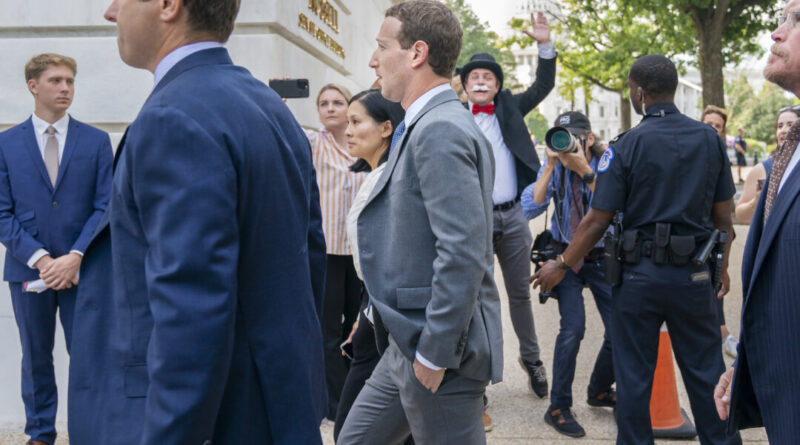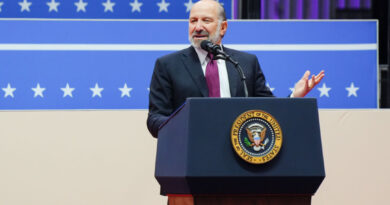Zuckerberg’s New Faith in Free Speech May Bring Heat From Foreign Governments
‘Governments and legacy media have pushed to censor more and more,’ Meta CEO Mark Zuckerberg stated.
Some social media users, many of whom were de-platformed or had posts removed by social media platforms, say that Meta CEO Mark Zuckerberg’s announcement that the platform intended to permit a greater degree of free expression is more than just a change in policy—it represents a complete reversal from the company’s actions over the past decade.
“What Zuckerberg and [Joel] Kaplan announced today is a significant departure from the prevailing ethos of supervision, even censorship, that has prevailed in Silicon Valley over the last decade or so,” James Pinkerton, political analyst and former White House staffer under Presidents Ronald Reagan and George H.W. Bush, told The Epoch Times.
Kaplan is Meta’s new global affairs officer, who reportedly played a leading role in crafting the new policies.
Facebook had been among the leading organizations—together with Google/YouTube and Twitter, now X—accused of removing or concealing content that conflicted with official narratives on issues such as global warming, COVID-19 origins and vaccines, race and gender topics, and, in the case of Hunter Biden’s incriminating laptop, information that could tarnish Democratic political campaigns.
Now, Zuckerberg says that his company is turning over a new leaf, conceding that “governments and legacy media have pushed to censor more and more” and that Meta platforms imposed “too much censorship,” removing millions of pieces of content every day.
Facebook’s New Program
Going forward, Meta will emulate X’s Community Notes program—by which platform users add notes to posts that they believe are false, misleading, or lacking in proper context—instead of employing official fact-checkers who remove or demonetize content, Zuckerberg said. Those providing community notes are reportedly chosen by consensus votes from other users and are selected to represent diverse political viewpoints.
Meta will also clarify and simplify its rules of conduct and remove restrictions on discussing topics such as immigration, gender identity, elections, politics, and other social issues, he said. And the company will relocate its “Trust and Safety and Content Moderation teams” from California to Texas in an effort to reduce political bias.
“I’m hopeful that, as Mr. Zuckerberg said, ‘we’re in a new era’ where social media platforms are incentivized to protect free speech,” Jeremy Tedesco, senior vice president of corporate engagement at the Alliance Defending Freedom, told The Epoch Times.
Other users, who faced censorship on Facebook, also expressed optimism.
Facing Government Pressure
Social media companies have faced intense pressure from government officials in the United States and abroad who want the platforms to be more aggressive in blocking content that the government disapproves of. Increasingly, countries in Europe have been criminalizing what they call “hate speech,” including prosecuting a parliamentarian in Finland for quoting the Bible online and in a radio interview regarding her church’s support for homosexuality (this case was ultimately dismissed in court).
“By the end of 2021, Facebook, YouTube, and Amazon changed their content moderation policies in ways that were directly responsive to criticism from the Biden administration,” the report said.
Facebook’s collaboration with foreign governments regarding speech controls occurred in the midst of threats from European officials, including fines imposed by the German government, for failing to remove content they deemed harmful.
Many analysts say that this week’s announcement represents a dramatic departure from the company’s actions to date.
“It’s a full 180 from Facebook’s disastrous 2018 ‘Blueprint’ that outlined plans for working with European governments to create laws and regulations that set out ‘where the lines should be drawn between free expression and safety,’” Tedesco said. “The clarity added by the new policies, paired with Meta’s new approach to enforcement, would be a major step forward for free expression, not only in the U.S. but also globally.”
Seeking Help From the Trump Administration
Zuckerberg said he will seek support from the incoming administration to defend his free-speech policies against retribution from foreign governments.
“We’re going to work with President Trump to push back on governments around the world that are going after American companies and pushing to censor more,” Zuckerberg stated. “The U.S. has the strongest constitutional protections for free expression in the world.
“Europe has an ever-increasing number of laws institutionalizing censorship and making it difficult to build anything innovative there. Latin American countries have secret courts that can order companies to quietly take things down.”
President-elect Donald Trump voiced support for Zuckerberg, stating, “Meta, Facebook, I think they’ve come a long way.”
Many critics are now praising Zuckerberg for taking what could prove to be a difficult path, with many governments still seeking to punish platforms that challenge official narratives.
“Courage begets courage,” Tedesco said.
“Mr. Zuckerberg didn’t have to point out the problem of global censorship in his announcement, but he went out of his way to do so. If Mr. Zuckerberg follows through on his promise to stand tall against censorious government regimes, he won’t be standing alone.”





